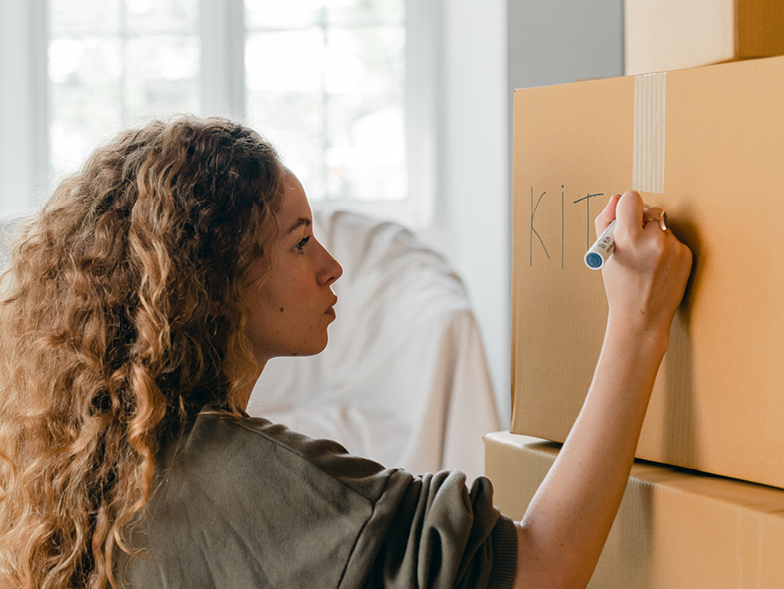Moving Tips That Save You Time and Money
Whether you are moving across town or across the country, the logistics involved in packing up all of your possessions, relocating them, and then getting settled in a new home can be intimidating. When you were younger, you may have just thrown a few things in the back of a pickup; a major professional move is an entirely different affair.
Here are some of the best tips and tricks for making your move simpler and more affordable while saving time and ensuring maximum efficiency. The key? Being proactive, organized, and flexible.
Saving Money on Your Move
By the time you’ve paid closing costs, you may not have a great deal of money left over to pay for the actual move. Here are ten ways to make your move more affordable—and a few things that are worth the extra cost.
- Compare rates for at least three movers to determine who offers the best price for your move. Don’t be afraid to negotiate, especially on extra charges and fees.
- Try to schedule your move during off-peak periods, including the middle of the month and the middle of the week. In addition, rates are normally lower in the fall and winter rather than the busier spring and summer months.
- Whether you’re paying by the hour or by the weight of your items, you’ll save money by getting rid of things you don’t like, don’t need, and don’t use. Don’t pay to move clothes you don’t wear or furniture you want to get rid of anyway. Have a yard sale or give extra items to charity before you pack.
- If you’re moving a long distance and you’re confident in your driving ability, you may save money with a do-it-yourself move. Hire movers to fill your rental truck at your current home and empty it at your destination. By doing the driving yourself, you’ll save significantly.
- Similarly, if you have an extra vehicle to haul, you may save by asking a friend to drive it to your destination, then buying them a plane ticket home. This can save you hundreds on the cost of shipping an automobile.
- Keep a careful record of shut-off and turn-on dates for your utilities and services, as well as the billing date for monthly insurance premiums. You don’t want to pay for services and coverage in both places if you can avoid it.
- If you’re moving locally, handle easy-to-move, fragile, and valuable items yourself. Move clothing, pictures, and bedding in your own car so that there’s less to box up and put on the truck.
- If your movers charge by the hour, stack boxed items as close to the door as possible or even in the garage so that they can grab them and put them on the truck. This will save time (and money) hauling items throughout the home.
- Use sheets, blankets, towels, pillows, and other soft items as cushioning for fragile pieces in order to save money on packing supplies.
- Look into moving insurance policies in order to protect yourself in the event that something is lost or broken during transport.
Services and Products That Are Worth the Extra Dollars
Even if you’re trying to save money on your move, there are some items that are worth spending a little more on. These include:
- Heavy-duty boxes for your most fragile items. While supermarket freebies may work for some things, you’ll want to have high-quality boxes for dishes or valuables.
- Specialty inserts like dish dividers and glass kits to customize your moving boxes, save you time, and save money on bubble wrap.
- Color-coded labels with bold-type room indicators. These will make it fast and easy to pack your items and to direct the movers once they’ve arrived.
- High-quality packing tape and tape guns to make packing faster, easier, and less frustrating.
- Plastic mattress covers to ensure that your mattresses stay dust- and bug-free during the move.
Saving Time on Your Move
If money is no object, you may be more focused on making your move fast and efficient. Here are some ways to save time throughout the process.
Label boxes carefully and completely.
Don’t just label packing boxes with the room they go to. Add as many details as possible so that you know exactly what is in a box before you open it. For example, instead of just writing KITCHEN, write:
- KITCHEN
- White casserole dishes
- Stainless steel mixing bowls
- Trivets
- Cookie sheets
- Cutting boards
That will allow you to ensure that everything is exactly where it should be during your unpacking process. It will also help you to prioritize the order in which you unpack.
Allow your mover to pack and unpack.
For an added charge, your mover can pack your entire house before the move and even unpack once you’ve arrived at your destination. This can save you days or weeks gathering supplies and packing up your household before your move. After you arrive at your new home, items will be unpacked in the room where they belong and your movers will haul away all of the boxes for you. Then, all you have to do is put each of your belongings in their proper places.
Pack a “first day” box.
One of the most annoying things you’ll encounter when you move is the amount of time you spend looking for things that you need in order to function during the first day and evening. By packing a box for each family member with essentials for the first twenty-four hours, you’ll save time, energy, and frustration. Pack linens, towels, pajamas, a change of clothes, a coffee cup, and other must-haves for the first night and the next morning. For children, pack a favorite toy, favorite book, nightlight, and any other item that is part of the bedtime routine.




Comments
Post a Comment